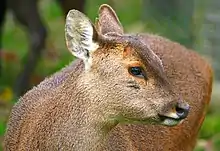Hyelaphus
Hyelaphus (golden deer or hog deer) is a genus of relatively small deer found in South and Southeast Asia. The four species are all threatened, and two species are restricted to a few small islands. Originally considered a subgenus of Axis, genetic evidence indicates that Hyelaphus is closer to the genus Rusa than Axis. Consequently, Hyelaphus was elevated to genus status, leaving the chital as the only member of Axis.[1][2]
| Hyelaphus | |
|---|---|
 | |
| A Bawean deer | |
| Scientific classification | |
| Kingdom: | Animalia |
| Phylum: | Chordata |
| Class: | Mammalia |
| Order: | Artiodactyla |
| Family: | Cervidae |
| Subfamily: | Cervinae |
| Genus: | Hyelaphus |
| Species | |
|
Hyelaphus annamiticus | |
Species
| Image | Scientific name | Common Name | Distribution |
|---|---|---|---|
.jpg.webp) | Hyelaphus annamiticus | Indochinese hog deer | Cambodia, Laos, China, and Vietnam |
 | Hyelaphus calamianensis | Calamian hog deer | Calamian Islands of Palawan province in the Philippines |
 | Hyelaphus kuhlii | Bawean deer | island of Bawean (Gresik Regency) in Indonesia |
 | Hyelaphus porcinus | Indian hog deer | Pakistan, northern India, Nepal, Bangladesh, southwestern Yunnan Province in China, western Thailand |
References
- Pitraa, Fickela, Meijaard, Groves (2004). Evolution and phylogeny of old world deer. Molecular Phylogenetics and Evolution 33: 880–895.
- Groves (2006). The genus Cervus in eastern Eurasia. European Journal of Wildlife Research 52: 14-22.
This article is issued from Wikipedia. The text is licensed under Creative Commons - Attribution - Sharealike. Additional terms may apply for the media files.
